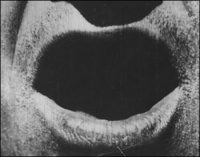Saying
From The Art and Popular Culture Encyclopedia
(Difference between revisions)
| Revision as of 22:10, 28 June 2011 Jahsonic (Talk | contribs) ← Previous diff |
Revision as of 15:51, 2 January 2013 Jahsonic (Talk | contribs) Next diff → |
||
| Line 1: | Line 1: | ||
| + | [[Image:The Big Swallow.jpg|thumb|right|200px|This page '''{{PAGENAME}}''' is part of the [[linguistics]] series.<br> | ||
| + | <small>Illustration: a close-up of a [[mouth]] in the film ''[[The Big Swallow]]'' (1901)</small>]] | ||
| {{Template}} | {{Template}} | ||
| A '''saying''' is something that is said, [[notable]] in one respect or another. | A '''saying''' is something that is said, [[notable]] in one respect or another. | ||
Revision as of 15:51, 2 January 2013

This page Saying is part of the linguistics series.
Illustration: a close-up of a mouth in the film The Big Swallow (1901)
Illustration: a close-up of a mouth in the film The Big Swallow (1901)
|
Related e |
|
Featured: |
A saying is something that is said, notable in one respect or another.
Another definition: a saying “is the simple, direct term for any pithy expression of wisdom or truth." From “When is a Pig a Hog?: A Guide to Confoundingly Related English Words” by Bernice Randall (Galahad Books, New York, 1991).
Depending on the aspects of the notability, there are a number of synonyms, or flavors of the notion:
- Apothegm. “…an edgy, more cynical aphorism; such as, ‘Men are generally more careful of the breed of their horses and dogs than of their children.’" From “What’s the Difference? A Compendium of Commonly Confused and Misused Words” by Jeff Rovin (Ballantine Books, New York, 1994).
- Aphorism. A concise definition, notably memorable.
- Adage. An aphorism that has gained credibility by virtue of long use.
- Chestnut. A long-used and well-known story, comment, or quote.
- Cliché. An overly commonplace, hackneyed or trite saying.
- Epigram. A poetic form of comment on a particular idea, occurrence, or person.
- Epithet. A descriptive word or phrase that has become a popular formulation.
- Gnome (Greek: gnome, from gignoskein, to know). A type of saying, especially an aphorism or a maxim, that is designed to provide instruction in a compact form.
- Idiom. “…an expression whose meaning can’t be derived simply by hearing it, such as ‘Kick the bucket.’” From “What’s the Difference? A Compendium of Commonly Confused and Misused Words” by Jeff Rovin (Ballantine Books, New York, 1994).
- Mantra. A religious or mystical syllable or poetic phrase.
- Maxim. A fundamental priniciple or rule. A maxim is a wise saying, especially one intended to advise or recommend a course of conduct. In comparison to its approximate synonyms: saying, adage, saw, motto, epigram, proverb, aphorism, the term maxim stresses the succinct formulation of an ultimate truth, a fundamental principle, or a rule of conduct. The word derives from the Latin word maximus, "greatest", via an expression maxima propositio, "greatest premise".
- Motto. A concise expression of motivation.
- Platitude. A flat, insipid, trite, or weak remark.
- Proverb. An expression of practical truth or wisdom.
- Quip. A witty or funny observation.
- Saw. A saying that is commonplace, longstanding and occasionally trite.
- Witticism. A smart saying, notable for its form or style rather than its content.
Unless indicated otherwise, the text in this article is either based on Wikipedia article "Saying" or another language Wikipedia page thereof used under the terms of the GNU Free Documentation License; or on research by Jahsonic and friends. See Art and Popular Culture's copyright notice.

